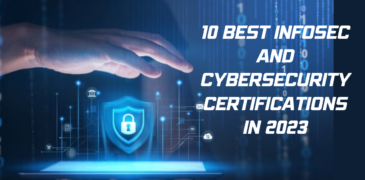In the ever-evolving landscape of cybersecurity and information security (InfoSec), staying up-to-date with the latest certifications is essential. These certifications not only validate your expertise but also open doors to exciting career opportunities in a field where demand is continually growing. Whether you’re looking to start a career in cybersecurity, advance your existing career, or simply expand your knowledge, this guide will introduce you to the ten best InfoSec and cybersecurity certifications in 2023. These certifications cover a range of expertise levels and domains, ensuring there’s something for every cybersecurity professional and enthusiast in this dynamic and critical field.
Certified Information Systems Security Professional (CISSP)
The Certified Information Systems Security Professional (CISSP) certification is one of the most prestigious and globally recognized credentials in the field of cybersecurity. CISSP validates an individual’s expertise in information security, covering a wide range of topics such as risk management, security architecture, cryptography, and security operations. It’s designed for professionals with experience in security and offers a comprehensive understanding of cybersecurity principles and best practices. CISSP-certified individuals are sought after by organizations worldwide to lead, design, and manage their security programs. This certification is a testament to a practitioner’s commitment to safeguarding information assets and plays a pivotal role in advancing a cybersecurity career.
Certified Ethical Hacker (CEH)
The Certified Ethical Hacker (CEH) certification is a highly regarded credential for professionals seeking to understand and master the mindset and tools of malicious hackers to better defend against cyber threats. CEH provides a comprehensive understanding of ethical hacking techniques, including penetration testing, vulnerability assessment, and network security. It covers a wide range of cybersecurity domains, enabling individuals to identify and mitigate vulnerabilities in computer systems and networks. CEH-certified professionals are equipped with the skills and knowledge to assess an organization’s security posture proactively and recommend safeguards. This certification is instrumental in preparing cybersecurity experts to stay one step ahead of cybercriminals.
Certified Information Security Manager (CISM)
The Certified Information Security Manager (CISM) certification is a globally recognized credential designed for professionals who manage, design, and oversee an enterprise’s information security program. CISM focuses on information risk management, governance, incident response, and security strategy. This certification validates expertise in aligning security initiatives with business goals and ensuring the effective management of information security resources. CISM-certified individuals are equipped to identify and manage risks while also demonstrating their commitment to maintaining high standards of information security. CISM plays a crucial role in advancing the careers of professionals in information security management and is highly valued by organizations seeking skilled security leaders.
Certified Information Security Auditor (CISA)
The Certified Information Systems Auditor (CISA) certification is a globally recognized credential for professionals specializing in information systems auditing, control, and assurance. CISA focuses on auditing, control, assurance, and security skills, ensuring that individuals can assess an organization’s information systems and business processes effectively. This certification is designed for those who wish to excel in evaluating an organization’s information systems, identifying vulnerabilities, and ensuring compliance with regulatory standards. CISA-certified professionals play a critical role in helping organizations protect their information assets and ensure the integrity, availability, and confidentiality of data. It’s a valuable certification for individuals seeking a career in IT auditing and security assurance.
Offensive Security Certified Professional (OSCP)
The Offensive Security Certified Professional (OSCP) is a highly respected and hands-on certification in the field of ethical hacking and penetration testing. Offered by Offensive Security, OSCP is known for its challenging 24-hour practical exam, where candidates must exploit vulnerabilities in a controlled environment to gain access. This certification emphasizes real-world skills, ensuring that individuals can identify and exploit security weaknesses effectively. OSCP-certified professionals are well-equipped to conduct penetration tests, vulnerability assessments, and security audits, making them valuable assets for organizations seeking to fortify their cybersecurity defenses. The OSCP certification is a badge of honor among ethical hackers and security experts.
CompTIA Security+
CompTIA Security+ is an essential entry-level security certification that validates fundamental skills necessary for various cybersecurity roles. This certification showcases your ability to evaluate an organization’s security, safeguard cloud, mobile, and IoT environments, comprehend legal regulations pertaining to risk and compliance, and effectively respond to security incidents. Holding a Security+ certification can open doors to roles such as systems administrator, help desk manager, security engineer, cloud engineer, security administrator, IT auditor, and software developer. While there are no strict prerequisites, it’s recommended to earn your Network+ certification and gain around two years of IT experience with a security focus. The cost of the exam is approximately ₹30,338 (equivalent to $370 USD).
Global Information Assurance Certification (GIAC)
The Global Information Assurance Certification (GIAC) is an entry-level security credential designed for individuals with a foundational background in information systems and networking. Attaining this certification validates your competence in various security domains, including active defense, network security, cryptography, incident response, and cloud security. If you have some prior experience in IT and aspire to transition into the cybersecurity field, considering the GSEC exam is worthwhile.
Job roles that align with the skills demonstrated by the GSEC certification encompass IT security manager, computer forensic analyst, penetration tester, security administrator, IT auditor, and software development engineer. Notably, there are no strict prerequisites for taking the GSEC exam; however, it is advisable to acquire some experience in information systems or computer networking to enhance your chances of success.
Systems Security Certified Practitioner (SSCP)
The (ISC)² Systems Security Certified Practitioner (SSCP) is an intermediate-level security credential that demonstrates your ability to plan, implement, and oversee a secure IT infrastructure. The SSCP exam assesses proficiency in a wide range of security domains, including access controls, risk assessment and analysis, security administration, incident response, cryptography, and network, communications, systems, and application security. This certification is tailored for IT professionals actively involved in an organization’s security systems and assets.
Relevant job roles for SSCP-certified individuals include network security engineer, system administrator, systems engineer, security analyst, database administrator, and security consultant. To qualify for the SSCP exam, candidates should possess at least one year of paid work experience in one or more of the testing areas, which can also be satisfied with a cybersecurity-related bachelor’s or master’s degree.
CompTIA Advanced Security Practitioner (CASP+)
The CompTIA Advanced Security Practitioner (CASP+) certification is tailored for cybersecurity professionals seeking to showcase their advanced skills while staying deeply involved in technology-focused roles, as opposed to transitioning into management positions. The CASP+ exam delves into advanced subjects, including enterprise security domains, risk analysis, software vulnerability assessment, securing cloud and virtualization technologies, and cryptographic techniques.
Attaining CASP+ can unlock opportunities in advanced architecture, risk management, and enterprise security integration roles, with potential job titles ranging from security architect and security engineer to application security engineer, technical lead analyst, and vulnerability analyst. While there are no strict prerequisites for taking the CASP+ exam, CompTIA recommends it for experienced cybersecurity professionals with at least 10 years of IT administration experience, including five years of hands-on security expertise.
GIAC Certified Incident Handler (GCIH)
The Global Information Assurance Certification (GIAC) Certified Incident Handler (GCIH) credential validates your expertise in offensive cyber operations, encompassing common attack techniques, vectors, and your proficiency in detecting, responding to, and defending against cyberattacks. The GCIH exam assesses your knowledge of incident handling, computer crime investigation, hacker exploits, and hacker tools.
This certification is particularly relevant for professionals engaged in incident response roles. Job titles aligned with GCIH-certified individuals may include security architect, system administrator, or similar positions. While there are no strict prerequisites for the GCIH exam, possessing a foundational understanding of security principles, networking protocols, and familiarity with the Windows Command Line is advisable.
Conclusion
In the dynamic world of cybersecurity and information security, certifications are invaluable for career growth and expertise validation. The ten best InfoSec and cybersecurity certifications for 2023 offer a diverse range of options to suit various career paths, from ethical hacking to risk management and secure software development. These certifications are essential for both aspiring and seasoned cybersecurity professionals looking to stay ahead in the constantly evolving field.
Also Read:







